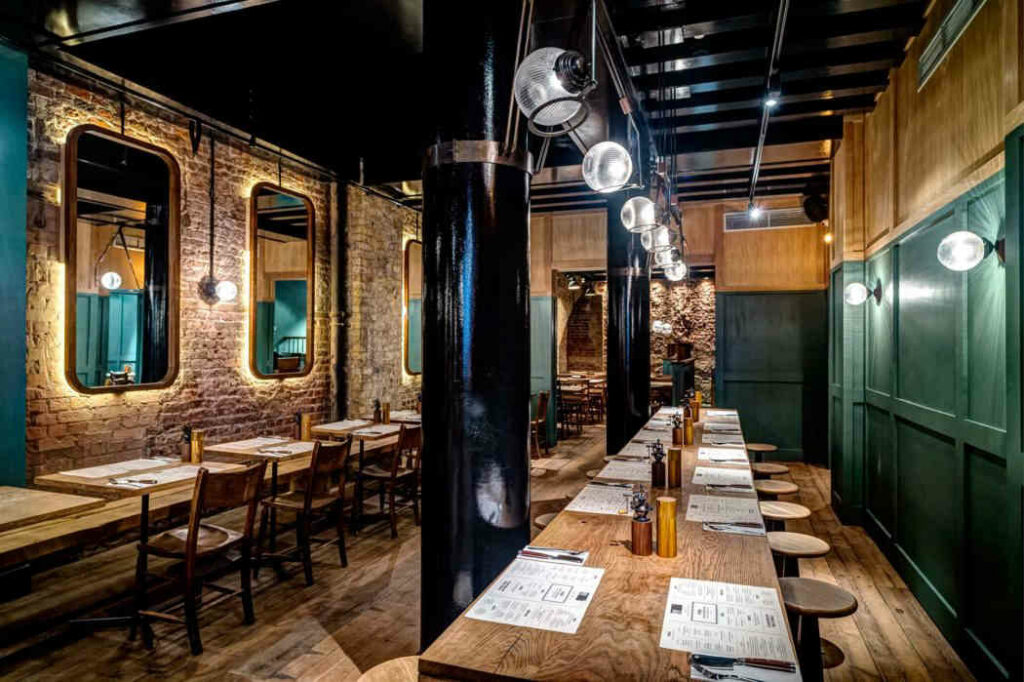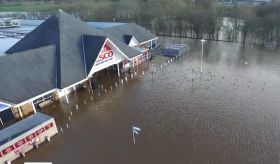Retailer news
Written by, Jason Kilbride

Amidst a backdrop of slowing inflation and ongoing increases in bank interest rates, the second quarter of this year bore witness to an astonishing 7.8% surge in wages across the UK. While the influence of inflation and its subsequent economic ripples cannot be underestimated, it’s important to recognise that this remarkable upswing in wages is also being propelled by talent shortages and a growing realisation among employees about their value to organisations.
To put it plainly, a scarcity of talent is palpable across the entire spectrum of the workforce, spanning from low-skilled positions to the C-Suite level. The battle to attract and retain talent is proving to be more challenging than ever. Companies are finding themselves compelled to pay higher wages to retain existing staff and to entice new talent, a struggle that’s exacerbating the difficulty of recruitment and ultimately leading to heightened remuneration packages. All of this is happening while companies are grappling with pressures on their bottom line from multiple directions. This presents a dilemma: should remuneration be increased, even if it adds strain to the bottom line? Is it justifiable to onboard recruits with higher salaries? Or should companies opt for leaving vacancies, thereby shifting pressure elsewhere?
This complex situation is particularly evident in specific sectors, where wage increases are surging at a rate that often doubles or even exceeds the aforementioned 7.8%. With inflation and talent shortages as driving factors, candidates are strategically negotiating for higher compensation, capitalizing on the challenging positions that companies currently find themselves in. Essential roles that have suffered from talent shortages for years are witnessing regular wage hikes, often outpaced by competitors, and the demand for young, skilled talent is simply outstripping supply. The urgency to acquire these skills is undeniable, leading companies to opt for immediate salary increases rather than waiting to invest in training and development that would yield returns several years down the line.
As people contend with rising utility costs (though there’s a positive trend), food prices (which might have been undervalued for years), and evolving mortgage rates, businesses have a responsibility to offer support.
However, as the need to attract talent grows, there’s a threshold that cannot be crossed. While there’s no magical solution to the talent shortage, and inflation is here to stay for the short term, millions of individuals are yet to be affected by mortgage rate changes, and their financial strain is yet to be fully felt. In short, wage increases are likely to persist for a few more quarters, although not necessarily at the same level.
The pivotal question emerges: What’s the remedy? Although I lack a definitive answer, I believe several strategies can contribute. Companies should consider a broader pool of candidates, potentially embracing transferable skills, less experienced individuals, or even flexibility in terms of location. These adjustments can grant access to a broader talent pool, alleviating the pressure to rely on salary increments solely. Focusing on non-monetary benefits can also prove advantageous; cultivating an environment where individuals feel valued through initiatives like summer hours, team outings, training, career development, and even schemes like electric car incentives can provide a competitive edge, reducing the sole emphasis on salary.
While long-term solutions like apprenticeships, graduate programs, internal development plans, and engaging with younger audiences hold potential, they won’t provide an immediate fix for the current wage and talent challenges. The prospect of automation has shifted from being a long-term investment to a medium-term one, and in some cases, even a short-term solution. Despite rising interest rates affecting businesses with limited cash flow, the timeline for automation implementation has still been shortened.
Of course, there could be many more strategies to consider, but the key is to nurture creativity. With salary increases unsustainable at their current pace, finding innovative approaches becomes imperative.
In a landscape characterized by uncertainty, it’s essential for all stakeholders to carefully balance the equation between salary hikes and adjustments to hiring strategies. What’s clear is that the challenge posed by wage increases isn’t going away anytime soon.

In an exclusive interview with Darren Smith, Head of Operations at Flat Iron and a specialist in the food service industry, we gain insights into the lasting impact of the COVID-19 pandemic on the sector.
Darren shares his perspectives on various aspects, including the challenges faced, changes in consumer behaviours, technological advancements, supplier relationships, and the future outlook.
When reflecting on the return to pre-pandemic volume and sales and whether it is back to business as usual, Darren notes, “Yes, our 12 trading sites are all located in key London transport hubs so we have luckily been quite well protected. Mondays and Fridays have changed somewhat with people working from home, but we feel the trade has just shifted around slightly rather than ‘lost’.”
Regarding the biggest challenge posed by the pandemic, Darren emphasizes the impact on staffing, saying, “Struggling for people, for sure, finding the right ones and training them. Our workforce was decimated post-pandemic, which also limited our ability to induct and train well. Ingraining the culture of the business was difficult when 75% of the workforce has less than 3 months of tenure. I feel we are getting back to where we need to be, but it’s taken a while to get there.”
Discussing changes in consumer behaviours, Darren highlights the influence of Gen Z and their dining preferences, stating, “Gen Z is dining (and paying) differently. They are happy to pay for a meal with PayPal/Klarna, and pay at the table has taken off industry-wide. Also, TikTok is a platform to promote our brand, when we launch new restaurants or dishes, lots of our new guests are finding out about us through TikTok rather than Facebook/Instagram.”
Considering steps taken to prepare for future crises, Darren explains, “We were already in the process of moving our beef supply and any quirks with our supply chain to the UK, with Brexit on the horizon, it made sense. Covid just accelerated that process. I think the one great learning would be to not rush decisions.”
While exploring opportunities for innovation and growth, Darren mentions the implementation of technology-driven solutions, saying, “QR codes and order at the table, however, most of these have now been removed and felt specific to Covid rather than permanent innovations. Specifically to us, we also brought in free ice cream for all diners, as a value proposition we saw an opportunity to add value to an experience when everyone else has been cutting back or increasing prices.”

Considering the role of technology in the sector’s response to the pandemic, Darren points out, “A lot of the tech innovations were driven by people shortages and cost savings. Some of the innovations like order screens were probably on the way in any way for QSR-style businesses. QR codes came and went just as fast, but I think businesses are coming to terms with data capture and guest feedback more than ever before.”
Reflecting on the positive aspects learned from the pandemic and the changes it brought into the business, Darren states, “Due to the talent shortage, I think lots of progression opportunities were presented to people across the sector. I think we are all more willing to take a chance on people who display the right attitude and support them on the journey.”
Looking ahead to the next 12 to 18 months, Darren shares Flat Iron’s business outlook, saying, “We are looking to ramp up expansion with our first sites outside London. Cambridge opens in late July, and Manchester hopefully later this year, which is exciting. We anticipate a few challenges: supply chain and translating our culture and values to a new team. I’m sure there will be a few we haven’t thought of, but we all look forward to the challenges ahead.”
If you haven’t yet tried Flat Iron Steak in London you must!
Retailer reports ‘strong’ Christmas trading although saw sales fall by 1.5% during the third quarter
Tesco saw like-for-like sales rise by 1.3% during the key six-week Christmas trading period thanks to low prices and a strong “seasonal offering”.

In contrast, like-for-like sales fell by 1.5% during the retailer’s Q3 (13 weeks to 28 November), which the retailer said was down to not repeating ‘£5 off £40’ national coupon campaigns from the previous year.
Chief executive Dave Lewis said more staff on shop floors boosted sales over Christmas, which also saw volumes rise by 3.5% and transactions increase by 3.4%. He hailed the Christmas results as a “significant improvement” on recent years.
“Our Christmas performance was strong, benefiting from lower prices on an outstanding range of products,” Lewis said. “Our customer service improved materially and our colleagues went the extra mile.
“Through our ongoing investment in lower, more stable prices, we were around five per cent cheaper than last year on the lines that mattered most to our customers at Christmas.”
Lewis said strong Christmas performance was evident across all formats and categories, including positive like-for-like sales growth in Tesco Extra.
International sales have continued to grow, he continued, including positive sales momentum in Europe and Asia, and the Thai business reaching its highest-ever market share.
“There is plenty more to do, but we are making good progress and are trading in line with profit expectations for the full year,” he added.
Retailer’s announcement relaunches price war into 2016 while CEO Andy Clarke says ‘radical and logical action’ is needed
Asda has invested £500 million in further price cuts in the first major move this year for price war between the top four retailers and discounters.
Chief executive Andy Clarke said the business must take “radical action” to win back customers and said he expects 2016 to be another year of intense pressure.
The investment into prices comes on top of the £1 billion over five years Asda said it would invest into price in November 2013. It is part of Project Renewal – a two-year programme within Asda’s five-year strategy to reinforce its value proposition.

The news comes as Asda also announced it has joined European buying alliance EMD, which will help develop the company’s own-label range. EMD is made up of 14 national buying structures and pools the collective buying power of 250 supermarket chains.
EMD membership will help develop a “radical shake-up” of its approach to buying, Asda said, and alongside leverage from IPL it will be able to “release significant savings from its supply chain”.
Clarke said: “Asda is unquestionably the UK’s lowest price full range supermarket business and we intend to strengthen that position. Indeed, we reaffirmed this as 2016 began when we became the first retailer to cut unleaded and diesel prices below £1.
“The structure of UK grocery retailing has permanently changed to reflect the way that customers shop today. Being part of Walmart also gives us insight into similar trends in the rest of the world and it’s clear that this is a global phenomenon.”
Clarke said Asda saw the change coming and responded in 2013 but “didn’t move fast enough”. “There is currently no growth in the food market and the rise of the limited assortment discounters means that we must take radical action to win back our customers. Today, from our strong financial position, we are taking another bold step forward in our five year strategy,” he said.
“Fundamentally changing how we buy products means we can realise significant savings from our cost base and pass these directly to customers through a rebased pricing model. Joining forces with the huge EMD network of 250 European supermarkets will give us significant economies of scale. We’ll continue to work with our suppliers to lower costs in our supply chain and return sales to growth in partnership.
“But we are not complacent. We remain cautious and, as the chancellor warned on Thursday, we expect that 2016 will be another year of intense pressure at a macro-economic level in addition to sales remaining under strain from price deflation, a continued competitive background throughout the sector and radically changing customer shopping habits.”
Alongside the price cuts, Asda will also invest in 95 of its largest stores to make them “more relevant”, removing “fringe ranges” and investing in own-label.
Clarke continued: “We know our customers better than anyone else and we need to structure our offer to meet their changing needs. This knowledge has shaped our plans to make our bigger stores easier to shop, laying them out in a way that’s relevant to today’s customers by removing fringe, marginal ranges, significantly investing in our own label ranges and providing services that they need.”
He warned that industry faces “more turbulence” in the short-term, but insisted that in the long-term he has the “right and winning strategy”.
“We expect that 2016 will be another year of intense pressure at a macroeconomic level, in addition to sales remaining under strain from price deflation, a continued competitive background throughout the sector, and radically changing customer shopping habits,” Clarke said.
The news comes as both Aldi and Lidl begun 2016 by reducing the price point of select promoted fresh produce items from 39p to 29p. Trading figures for the key Christmas period are due this week (w/c 11 January) for several of the major retailers, with Asda due to report in mid February.
Retailer set to build 10,000 sq ft temporary store in carpark of flooded superstore, while Cumbria recovers from severe floods
Tesco is building a temporary store in the carpark of its flooded Carlisle superstore while the region continues to recover from devastating floods.

The retailer said work on the 10,000 sq ft temporary building should be completed by next Friday (18th December), local paper The News and Star reported, and will have standard store opening times.
All other Tesco stores across the county are open as normal, with the supermarket helping to provide free clean water and distribute ‘cages’ of supplies to those affected by floods. Cumbrian wholesaler A Stephenson has also been donating vegetable to the local town hall, which has been made into soup and offered to the community.
Tesco store director Shirley Turnbull told The News and Star: “I know that in the aftermath of something like this as the community starts to recover, it’s often simple things like somewhere to find basic supplies that can provide a little help.”
The news comes as Defra has released support packages of up to £20,000 for farmers who have been affected by Storm Desmond, to help restore damaged agricultural land.
Support funding is applicable for issues including restoring productive grassland or horticultural land, restoring farm vehicle access or repairing agricultural drainage.
Farming minster George Eustice also announced that the Rural Payments Agency will not carry out inspections in the flooded areas and increase flexibility when inspecting those affected.
He said: “We understand flooding can have serious consequences for farmers and we want to provide practical support to those affected by last weekend’s unprecedented rainfall in Cumbria and North Lancashire.
“The new Farming Recovery Fund will help to cover farmers’ short-term uninsured recovery costs, such as repairing damaged soils, tracks and flood channels. We will pay out on all eligible applications and we hope it will offer some relief at this challenging time.”
More rain is forecasted for the Cumbria and North Lancashire regions this weekend, with 13 flood warnings in place.
Severe flooding in Cumbria and Lancashire has left thousands of residents without power and major disruption to road and rail traffic
A Tesco Superstore and a Sainsbury’s in central Carlisle are under water following severe flooding in Cumbria and Lancashire that has left around 10,000 homes without electricity.

Storm Desmond saw around 340mm of rain fall in 24 hours, according to provisional figures reported by BBC News, which would be a new British record if verified.
Helicopter footage tweeted by Tesco shows the retailer’s store at Warwick Road, Carlisle, surrounded by deep water, while another image posted by a member of the public shows similar flooding at the Sainsbury’s.
Road and rail services have been severely disrupted with no trains running between Carlisle and Scotland today (7 December) due to flooding and a landslip.
Livestock has been left stranded, while the B5295 bridge at Braithwaite and Pooley Bridge in the Eden District have been washed away.
Fruit and veg wholesaler A Stephenson, based in Appleby-in-Westmorland, which has been affected by the floods, tweeted that its warehouse is open as usual, although its retail store is without power.
John Leyland, deputy director of operations at the Environment Agency told the BBC that the amount of rainfall was “beyond the forecasts” and the model used by the EA to trigger flood warnings does not account for persistent heavy rain.
Environment minister Liz Truss this morning chaired an emergency meeting of the Cobra committee. In a statement she said flood defences performed as they were designed to, but exceptional rainfall had led to defences being breached.
“Storm Desmond has largely passed, but rivers remain swollen and the ground is saturated by the significant volumes of rain we have seen in recent weeks,” she said.
“In particular, we are carefully monitoring the situation in Carlisle and York where river levels have not yet reached their peak.”
Mike Corbett has joined the retailer, Tesco after former company CFUK’s restructure meant TD role was made redundant

Mike Corbett has left his position as technical director at tropical fruit supplier Compagnie Fruitiere UK (CFUK) after a company restructure meant his role was “made redundant”.
Corbett, who was at the company for four and a half years, is now working for Tesco as technical manager for ambient salads. He will be based at the retailer’s Cheshunt headquarters before moving to Welwyn Garden City when the company relocates.
“Due to recent restructures within the company, it was with regret that Mike’s position of technical director was made redundant,” a spokesperson from CFUK said. “It was a pleasure to have worked with Mike and we wish him every success in his new role.”
CFUK procurement manager George Beedell has also left the business. He had been in the role for four and a half years.
Retailers not supporting Britain’s high-welfare pig farmers this Christmas season can expect to be named and shamed by the National Pig Association (NPA).

Those that put in a bulk Christmas order from countries with lower animal welfare standards, or provide misleadingly labelled gammons, will be made known to the public.
“In addition to carrying out our own checks, we are asking shoppers to check gammon labels carefully this Christmas to ensure the product they buy is made from cured British leg of pork, and not from imported pork that has only been cured in Britain,” said NPA chairman Richard Lister.
NPA’s Christmas “GammonWatch” campaign is conducting surveys across the country, with their findings being reportedly published in weekly bulletins until Christmas
“If our prices fall any further we will see more pig farmers freezing all investment in new buildings next year and others quitting altogether, and either route will be a serious blow to an industry that is known the world over for its high-welfare, high-quality product.”
According to NPA, only 30% of gammon currently available on the market during the festive season is British, this is despite there being plentiful supply from producers.
Dr Zoe Davies, NPA chief executive, believes the British public will be willing to pay extra for high-quality products: “We know from successive surveys that customers prefer to buy British pork and pork products even if it costs a penny or two more for the extra quality we offer,” she said. “This is especially true since horsegate in 2013 when most retailers sought to reassure customers by promising to stock more British meat.”
NPA’s Christmas GammonWatch will also include a special PorkWatch survey in December. PorkWatch is the industry’s bi-monthly survey of British pork, bacon, ham, sausage and, as of next month, gammon facings in supermarkets.
Supermarket giant set to pump £6 million into the development of the artisan business, which has seen losses increase after a rapid expansion
Tesco’s artisan coffee business Harris + Hoole has seen its pre-tax loss double, following a rapid expansion of the business.
The trendy chain opened 22 new shops in the most recent financial year, taking the total number of stores it has to 45.

The business posted a pre-tax loss of £25.6 million in the year ending 1 March 2015, compared to £12.8m for the year ending the 23rd of February 2014, accounts held at Companies House reveal.
The accounts also reveal that the business is set to need £6m of further funding from Tesco up to the end of 2017 in order to meet its financial obligations.
Speaking in the report accompanying the accounts, the directors noted: “The UK coffee market is highly competitive and already served by a number of international, national and local competitors.”
Tesco has reportedly so far committed to continue to provide financial support for at least another 12 months, and has said it intends to support up to £7.5m of funding, according to the Daily Telegraph.
The supermarket is also not seeking the repayment of its existing £48m loan to Harris + Hoole, and the interest it is owed by the business for the next year.
Tesco’s former chief executive Philip Clarke identified the business’ investment in Harris + Hoole as an opportunity to drive footfall into its Tesco Extra stores, as well as it providing an opportunity to tap into the growing casual dining scene.
The man previously in charge of Tesco’s collection of in-store restaurants and coffee shops, Michael Holmes, was ousted in March as part of new CEO Dave Lewis’ personnel clearout.